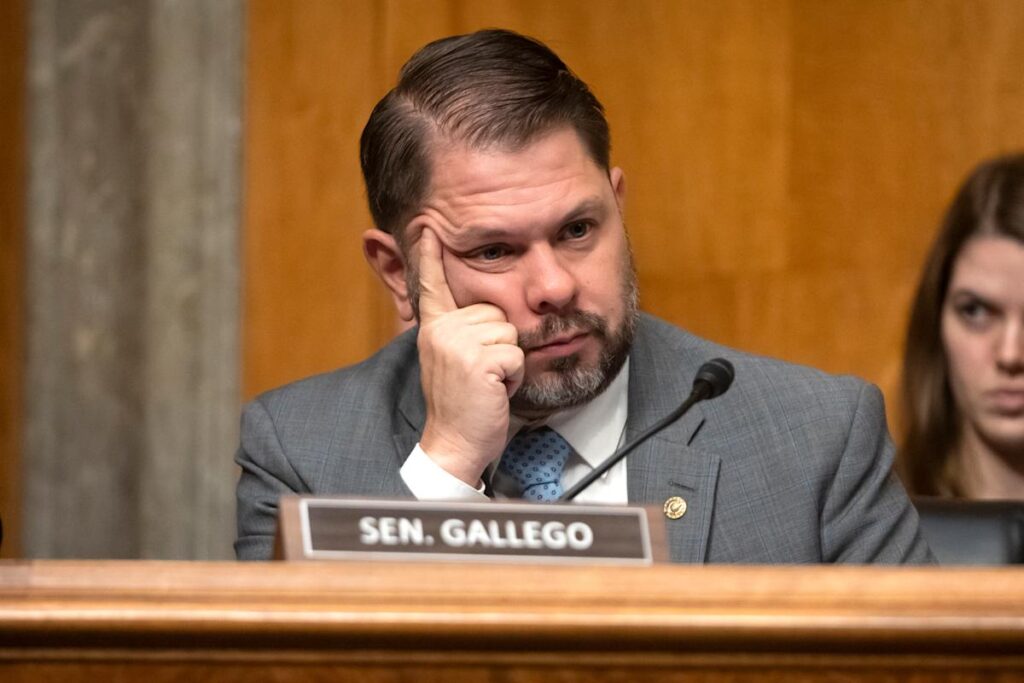A group of pro-crypto Senate Democrats said Saturday they would oppose GOP-led stablecoin legislation that some of them previously supported if it goes to the floor in its current form, a stunning twist that could jeopardize the bill’s path forward.
A group of nine Democrats who have previously backed industry-friendly crypto legislation wrote in a statement Saturday that “the bill as it currently stands still has numerous issues that must be addressed,” adding they “would be unable to vote for cloture should the current version of the bill come to the floor.” The statement was signed by four Democrats who voted in favor of the stablecoin bill when it cleared the Senate Banking Committee in March: Sens. Ruben Gallego of Arizona, Mark Warner of Virginia, Lisa Blunt Rochester of Delaware and Andy Kim of New Jersey.
The surprise statement comes as the Senate is expected to begin considering the landmark stablecoin bill in the coming days, with the first procedural vote on the legislation expected as soon as next week. The bill, which needs support from at least seven Democrats to pass the Senate, would create the first-ever U.S. regulatory framework for issuers of stablecoins, which are digital tokens that are pegged to other assets like the dollar.
Passage of the bill — led by Sen. Bill Hagerty (R-Tenn.) — would deliver a historic lobbying victory to the crypto industry, which has pushed for years for legislation that would help legitimize digital assets and boost the sector’s growth.
A growing number of Democrats have gotten on board with industry-friendly crypto legislation led by Republican lawmakers, but the Trump family’s deepening entanglements in the digital asset industry have complicated the dynamic in recent months. A crypto firm started by the president’s sons is planning to launch a stablecoin — one of several new ventures in the digital asset space that have sparked concerns about conflicts of interest.
Republicans were hopeful that the changes made to the bill since it was approved by the Banking Committee would clear the way for a big bipartisan vote on the floor. Many of the changes to the legislation were aimed at winning over Democrats, and new language was added touching several areas of concern that they cited in their statement Saturday. The turnabout could now give Democrats new leverage to extract additional concessions ahead of a floor vote.
The lawmakers wrote Saturday that the legislation needs “stronger provisions on anti-money laundering, foreign issuers, national security, preserving the safety and soundness of our financial system, and accountability for those who don’t meet the act’s requirements.”
The statement was also signed by Sens. Raphael Warnock of Georgia, Catherine Cortez Masto of Nevada, Ben Ray Luján of New Mexico, John Hickenlooper of Colorado and Adam Schiff of California, along with Gallego, Warner, Blunt Rochester and Kim.
They added that they “are eager to continue working with our colleagues to address these issues.”
“As stablecoins continue to grow in popularity, it is critical for Congress to work in a bipartisan fashion to create a regulatory framework that sets forth clear rules of the road,” they wrote. “We recognize that the absence of regulation leaves consumers unprotected and vulnerable to predatory practices. We have approached this process constructively and with an open mind, with the understanding that additional improvements to the bill would be made.”
The two Democrats who are co-sponsoring the stablecoin bill — Sen. Kirsten Gillibrand of New York and Angela Alsobrooks of Maryland — notably did not sign onto the statement.
Hagerty, the stablecoin bill’s lead sponsor, wrote in response to the Democrats’ statement that lawmakers “must advance legislation that enshrines American leadership in the digital asset space and protects the US dollar for centuries to come.”
“That time is now,” he wrote. “We have a choice here. Move forward and make any remaining changes needed in a bipartisan way, or show that digital asset and crypto legislation remains a solely Republican issue.”
Read the full article here


